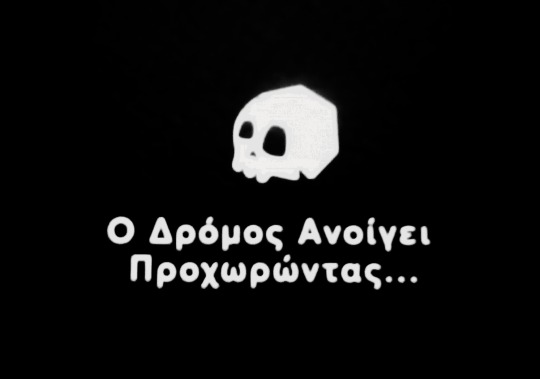#μι
Explore tagged Tumblr posts
Text
Η καλύτερη συμβουλή που μπορεί να δώσει η 12χρονη εμπειρία μου στο tumblr είναι ότι πίσω απο εκείνο το πολύ κουλ μπλογκ που σ' αρέσει ΔΕΝ κρύβεται ένα πολύ κουλ άτομο... μην απαντήσεις στο dm του
112 notes
·
View notes
Text

Έβλεπα παρά πέντε με τη κολλητή μου χθες και μου έδωσε το καλύτερο suggestion 🙏 Απορώ που δε το σκέφτηκα νωρίτερα
#στο παρά πέντε#στο παρα πεντε#sto para pente#my art#Ανδρέας Καλογήρου#επίσης αν το έχει κάνει ήδη κάποιο λετ μι κνοου κοίταξα αλλά δεν το βρήκα
47 notes
·
View notes
Text

Ανδρέας στιγμή.
#στο παρά πέντε#Ανδρέας Καλογήρου#στο παρα πεντε#my art :D#fanart#art#digital art#στο παρά πέντε φαναρτ#Ζάνα Ιωάννου#para pente#sto para pente#σορι ο γάμος αυτων των δύο είναι απλα πολυ αστείος. του μι.
31 notes
·
View notes
Text

Victim Of The Big Bad City
10 notes
·
View notes
Text
Αβάντι...
#Ντο φα φα φα#Σολ φα σολ φα μι ντο σι μι μι μι#Ντο σι ντο σι σολ σι ντο#(ντο σι)#Σολ φα σολ φα μι ντο μι#μ#το μόνο τραγούδι του κόσμου
3 notes
·
View notes
Text
Νομίζω για valentine's day πρέπει να μου πάρω ένα χταποδακι που το γυρνάς και αλλάζει διάθεση. Ακόμα δεν έχω 🤡
13 notes
·
View notes
Text
Ήταν όμορφη σαν την αυγή
Γιαυτό όταν τις κοιτούσα και τις παρατηρούσα ένιωθα μια γαληνη.
4 notes
·
View notes
Text
We would play "fantasy games" in which we all used fake nicknames and go for adventures in the garden and basically role play by saying "και καλά..." (and supposedly...) before saying what was canon
Oh also. The houses we made in the yard. Absolutely beautiful.
“You never pretended to be a bride when you were a little girl?” No???? Like literally never?
#μι μπι λαϊκ: θελετε να παιξουμε παιχνιδι φαντασίας? 🥺👉👈 με λενε διαμαντενια εσενα?#and then we'd go inside the bush#it looked like a portal what can i say
202K notes
·
View notes
Text
Me: I don’t make out with people at my parties bc my mom tends to show up at random
Hot lesbian who had a lip herpes flare last Saturday and is coming to said party: *says sth about the herpes having cleared out so we could make out in the elevator when we were leaving from CY*
Me: Let’s not risk it and do that at my party if you do want to.
Her: But you said you don’t make out with people at your parties
Me *very gay very panicking*: I can do make an exception
Her: *laughs at me*
the question is does she mean it? does she not?
Do I want her to mean it? If she does what happens?
DID I REALLY FUCKING MANAGE TO DEVELOP A CRUSH ON NOT ONE BUT TWO PEOPLE WHILE DAYS AWAY FROM FUCKING OFF FOR MONTHS?
1 note
·
View note
Text
Ναι γιατι φυσικα ως γνωστόν οι αντρες γουσταρουν απιστευτα τις γυναικες που μπαινουν αναμεσα στην πουτσα τους και το πορνο τους εννοειται ρε @your-littleminx2 πες μου που τους συναναστρέφεσαι αυτους να τους βρω κι εγω μπας και υπαρξει μια αλλαγη
Το onlyfans δεν είναι δουλειά, είναι αυτοταπείνωση ...🥹🥲Σόρρυ
#μαθατε τωρα ολοι το πικ μι και το λετε#δεν παιρνω θεση στο θεμα της εργασιας του σεξ γιατι δεν ξερω αρκετα για τον τομεα#αλλα φφς σκασε#και κανενας δεν θα διαλεγε γυναικες με αποψη στη σημερινη κοινωνια ασχετως του τι λεμε στο ταμπλρ για το ονλιφανς
122 notes
·
View notes
Text
καθόλου ωραίο το να εισαι η μονη ελευθερη στην παρέα κάθε φορα που γνωρίζετε κάποιο αγορι ειναι σε φαση "πως σου φάνηκε αυτος;" Λιβ μι αλοουν 💆🏻♀️
76 notes
·
View notes
Note
Hi, I am currently learning from Athenaze and Reading Greek books, I am at the very beginning and wondering how Attic and Koine Greek comper in the conjugation and declination of verbs, nouns and adjectives. Is there any difference? Thanks for the answer and sorry for bothering you!
I am very excited so far, I hope I am going to learn to read the classics one day!
No bother at all! Koine Greek ultimately derives from Attic, and so there's a great deal of overlap in vocabulary, grammar, and syntax. The main difference is that Koine, being as it was a second or third language for many non-native speakers throughout the Hellenistic world, is generally simpler than Attic. For example, where Attic is fairly heavy in verbs ending in -μι (τίθημι, ἵστημι, etc.), Koine tends to avoid them, or in some cases to replace them with forms from the same root that are conjugated in -ω. And in the realm of syntax, Koine favors parataxis (parallel clauses), as opposed to the frequent use of hypotaxis (subordinate clauses) in classical Attic. Generally speaking, if you have a firm command of classical Attic, Koine is very straightforward.
Good luck in your studies! If there's anything else I can do to help, please don't hesitate to ask.
9 notes
·
View notes
Text
Greek Transliteration of Slavic
The legacy of the Slavic languages being represented by the Greek alphabet go back very far. Traditionally Cyril and Methodius are given the attribution of inventing the Slavonic scripts to represent the languages instead of Greek which ill-represented the phonemes of Slavonic. Even so, there is a long history of Slavonic languages (mainly South Slavic) being represented by the Greek script. There are early examples of this (none that I have been able to find), but the more contemporary examples are well attested. Here, we will explore 3 scripts: the Konikovo Gospel, the Kulakiya Gospel, and the Pomak alphabet.
Konikovo Gospel (1852)
Ωἰτ Ιωάννα. Οὐτ πέρβȣ μπέσ̮ει ρὲτζ̮τα, ἡ ῥέτζ̮τα μπέσ̮ει σῶς Μπόγα, ἡ Μπὸγ μπέσ̮ε ῥέτζ̮τα· Βόα μπέσ̮ε ȣ̓τ πέρβȣ σῶς Μπόγα. Σῆτε ραμπώτη ζαρδὶ νεῖζ λακαρδίατα σὰ τζ̮εινήα, ἡ μπεῖζ νέγȣ νέ σα τζεινὴ νήκȣε ȣ̓τ κόλκȣ σὰ τζ̮εινία. (my transcription, I uploaded it onto wikipedia bc the previous version was not good) От Иоа́нна. Ут пе́рву бе́ши ре́чта, и ре́чта бе́ши со̂с Бо́га, и Бо́г бе́ше ре́чта. Во́а бе́ше утпе́рву со̂с Бо́га. Сѝте рабо́ти зарди́ нѝз лакарди́ата са́ чини́а, и бѝз не́гу не́ са чини́ ни́куе ут ко́лку са́ чини́а. (Source)
This document largely maintains how Greek is written, the main phonological difference is with /ʃ/ and /tʃ/ which are represented by a breve underneath the letter σ or ζ (σ̮ and .
Kulakiya Gospel (1863)
The transcription of this manuscript features a different type of transliteration, however. The author, Efstathios Kypriades, choses to represent sounds with different accents. Whereas the other manuscript uses μπ for /b/, Kypriades chose to represent it with π̈. Interestingly, the former represents /g/ and /d/ as γ and δ, but Kypriades makes a distinction between the Greek letters and the plosives of Slavonic (γ̈ and δ̈). The one similarity lies in the representation of /ʃ/ which uses the breve beneath. However, it is also used to represent palatalization (κ̮ for k'). The only other accent is a macron above the letter which represents the following /i/ sound becoming /i̥/.
Γ̈οσποδ̈νοβο ὶ σφετάγο Εὐαγγέλιο νὰ Π̈όγα νάσ̮αγο γ̈όλεμα Τσίκφα Χριστι̮άνοφ, ἰσκάρενο νὰ π̈ούγαρτσκο ἰζίκ̮, τουβάσ̮νο ζπόρ νὰ Βαρδ̈αρία, ζὰ οὐφ νεδ̈έλ̄ιτε σάτι, ζὰ γ̈ουδ̈��νατα, ἰ ζὰ σάτι πραζν̄ίτσ̄ιτι γ̈ολέμιτε, ζὰ τσέλα γ̈οδ̈ίνα ζὰ λ̄ειτουργ̈ίατα. Σὰ πισάλο ὀυτ Ευστάθιο Κυπριάδη οὐφ σέλοτο Κολακία. Νὰ 30 Νοέμβριῳ μέσιτς 1863. Господново и сфетаго евангелио на бога нашаго голема црикфа христианоф, искарено на бугарцко изик тувашно збор на Вардариа за уф неделите сати за гудината и за сати празницити големите за цела година за литургиата. Са писало ут Евстатио Киприади уф селото Колакиа на 30 ноемврио месиц 1863.
Interesting side note, the use of σ̮ is interesting as σ̈ is a character used in Arvanite Albanian to represent /ʃ/ at the same time (source). I'm not sure if this was a conscious choice, but I wanted to make note of it nonetheless.
Pomak Language
For a modern example, the Pomak language used in Greece is sometimes attested with the Greek alphabet. There are different methodologies behind the representation of this, however. Some attestations use additional accents and others don't. For example, the word жаба /ʒaba/ could be written Ζζέμπα or Ζ̌έμπα. Other variations used are: /ʃ/ could be σσ or σ̌, /tʃ/ could be τσσ or τσ̌, /dʒ/ could be τζζ or τζ̌.
Ουτσίλνικετ μόϊ γιε γιάτσε χούμπαφ. Ίμα αλτΐ ουνταγιέ. Μόγιενα ουνταγιό γιε γκουλα̈́μα. Ίμα τσσέτρι γκουλια̈́μι πέντζζουρε. Ράχλενε μι σα γιάτσε τσίστι. Ι χότζζιντα μάτσα γιε γιάτσε τσίστα. Ι ιζουτσσίλνικ ίμα γιεντίν σσιρόκ χαρέμ. Φαφ χαρέμαν ίμα ντβα βρίσε ι ντ��ε γκόρμιγιε. Ουτσσίλνκαν μόϊ γιε γιάτσε χούμπαφ. Για ουτσσίλνικεν, χότζζενε ι αρκαντάσσενε γκι γιάτσε μίλβαμ. (Source)
18 notes
·
View notes
Text
Αγάπησε με απόψε, τι έχει μείνει νιώσε
Το κορμί, το φιλί, το τέλος πριν την αρχή
Αγάπησε με απόψε, τη φλόγα πάλι δώσε
Στο κορμί και την ψυχή μου σώσε
Μι' Ανατολή γεμάτη φως σε περιμένω
3 notes
·
View notes


